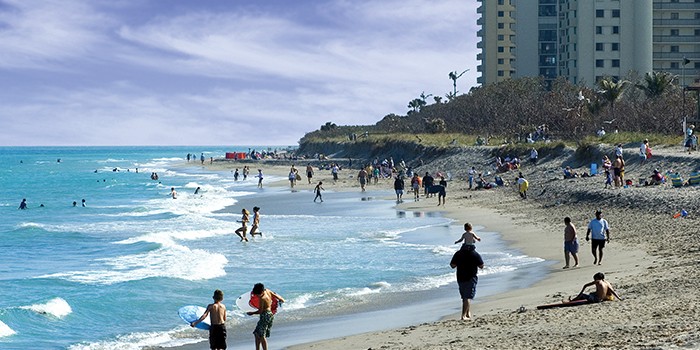Jupiter Medical Center
- 561.263.2234
- email us
- Jupiter, Florida, United States

JUPITER, FL – January 5, 2017 –Jupiter is famous for its beautiful coastline. This winter, while much of the world is shoveling snow, we are still happily digging our toes in the warm sand. But whether this is your first winter on Jupiter’s shores or your 101st, there are some seaside safety tips that never change. As the American Red Cross reminds us, following these simple steps ensure that you and your family have a safe and pleasant day at the beach.
SURF SWIMMING VS POOL SWIMMING
Swimming in the surf is different than swimming in a pool. It requires different skills to swim in the tides. When at the beach, always remain aware of the tides, swimming only in lifeguard-protected areas. Obey all instructions and orders from lifeguards. While swimming, remain alert to your surroundings, including the weather conditions. Always swim sober and never swim alone. Even if you’re confident in your swimming skills, make sure you have enough energy to swim back to shore.
SWIMMING WITH CHILDREN
The Red Cross recommends that young children and inexperienced swimmers wear U.S. Coast Guard-approved life jackets when in and around the water. Always pay close attention to children – and elderly persons – when at the beach. Even in shallow water, wave action and tidal pull can cause loss of footing.
NO DIVING
Don’t dive headfirst – protect your neck. Always check for depth and obstructions before diving, and go in feet first the first time.
WILDLIFE
Treat plants and animals with respect. Be sure to watch for aquatic life, because although the water plants and animals may look harmless, they may actually be very dangerous. When entering shallow water, be sure to do the “stingray shuffle,” shuffling your feet to avoid stepping on stingrays. If stung by a jellyfish, vinegar will neutralize the poison. Carry vinegar, along with sunscreen in your beach bag for this very reason. Avoid patches of plants. Leave animals alone. If you happen to find an injured animal, do not touch it. Call 9-1-1 and they will notify the appropriate agency.
RIP CURRENTS
Rip currents are responsible for most of the rescues performed by lifeguards. Rip currents can form in any large open water area, including low spots and breaks in sandbars, or near structures such as jetties and piers. For your safety, be aware of the danger of rip currents and remember the following tips from the American Red Cross:
If caught in a rip current, it is important that you stay calm and don’t fight the current.
Swim parallel to the shore until you are out of the current. Once you are free, turn and swim toward shore.
If you can’t swim parallel to the shore, float, or tread water until you are free of the rip current and then turn and head toward shore.
If you feel you can’t make it to the shore, draw attention to yourself by waving and calling for help.
Stay at least 100 feet away from piers and jetties because often permanent rip currents exist near these structures.
If someone is in trouble in the water, get help from a lifeguard. If a lifeguard is not available, have someone call 9-1-1. Throw the victim something that floats – a lifejacket, cooler, inflatable ball – and yell instructions on how to escape the current. Do not attempt to rescue them yourself.
When at the beach, always check conditions before entering the water. Check to see if any warning flags are up or ask a lifeguard about water conditions, beach conditions, or any potential hazards. A RED FLAG means NO SWIMMING (high hazard). A YELLOW FLAG means CAUTION (medium hazard). A GREEN FLAG means SAFE TO SWIM (calm conditions). A PURPLE FLAG means DANGEROUS MARINE LIFE.
LIFEGUARDS
Jupiter’s guarded beaches include Carlin Park, Coral Cove, Dubois Park, and Jupiter Beach Park. Each lifeguard station provides signs listing surf conditions, and local wild life present. The stations also fly the beach flag warnings. It is important to note that the absence of warning flags DOES NOT assure safe waters. •